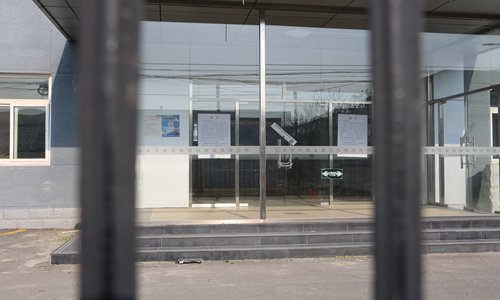
A logistics company in Beijing's Shunyi district that has been shut down amid the ongoing inspection campaign against unsafe buildings in the city Photo: Chen Qingqing/GT
Logistics companies in Beijing have been affected by an ongoing city-wide campaign against unsafe buildings and hazardous production, and hundreds of firms have been forced to move out of the city while others have been told to shut down.
In Tianzhu, an area near Beijing Capital International Airport where logistics services have been springing up for years, few of the firms open for business on Monday morning.
"November 17 was the deadline for logistics companies here to move," a local business representative surnamed Wang told the Global Times on Monday.
The 50-year-old woman came to Beijing nearly 15 years ago from Harbin, Northeast China's Heilongjiang Province, and opened a logistics services business in Tianzhu, which administratively belongs to Shunyi district.
"Many trucks passed by our station every day before. The area used to a logistics and transportation hub. Now it's not anymore," she said.
Illegal buildings, as well as places used for housing people and storing goods and at the same time for production are the facilities with a high possibility of safety violations, according to a document from the Beijing Municipal Commission of Housing and Urban-Rural Development.
The current inspection covers all districts in the city, with the focus on the rural-urban fringes.
"Nearly 300 logistics companies were forced to leave, which had a direct impact on other businesses in this area like repair services and restaurants," Wang said.
The crackdown on the logistics sector in the city is also affecting delivery services, as many packages have been delayed, and some packages could not be sent to the city.
For instance, one online store on taobao.com - an e-commerce platform owned by Internet giant Alibaba Group - that sells home supplies, posted an announcement recently saying that it could not ship any packages to Beijing.
Impact on business
Major delivery firms have posted notices to customers on their website lately.
Best Express said in its letter that all the company's affiliates and services stations in Beijing are covered by the inspection campaign and packages shipped to Beijing could be delayed.
STO Express, Yunda Express and YTO Express all posted similar letters on their websites.
Wang, the businesswoman, who works closely with other delivery companies, estimated that the companies' revenues would sharply drop after this campaign. "For example, previously, we could earn 200,000 yuan ($30,294) per month, but now we can only earn 40,000 yuan," she said.
There are a total of 577 logistics companies in Shunyi district, which have been playing an important role in improving product circulation and creating jobs, Li Xiangying, deputy head of the Shunyi district government, was quoted as saying in a report by the Beijing News on Sunday.
"For those that have significant safety risks, we have to shut them down, but the local government will help the business that are in line with safety requirements to maintain their operations," Li said.
Need to upgrade facilities
Beside logistics companies in Shunyi, some services stations operated by major delivery firms such as Yunda and STO are located in Dingfuzhuang, an area in Beijing's eastern Chaoyang district, and they have also been urged to halt operation before December 4.
Packages are piling up in an STO warehouse with large Chinese characters "tear down" written on the wall. "The local authorities asked us to leave as soon as possible, but luckily they have not cut off our electricity supply," said an employee at the warehouse, who preferred not to be named.
As delivery services have been expanding rapidly in China in recent years, some delivery companies' affiliates and service stations might not meet the local government's safety requirements, Shao Zhonglin, an industry analyst at Shanghai-based yongyiresearch.com, told the Global Times on Monday.
"It's necessary to do this large-scale safety inspection and prevent potential risks," he said.
China's delivery services have maintained an annual growth rate of more than 50 percent over the past five years, and the domestic market has become the world's largest since 2014, according to a post published on the central government's website in August. The total revenues of the delivery sector reached 397.4 billion yuan in 2016.
"The fast expansion of delivery services has enabled unqualified operators to join in, and the ongoing inspection will also tackle this issue as it will force companies to upgrade their facilities," Shao noted.


